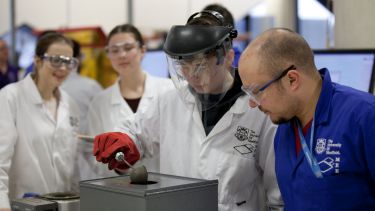Science and Engineering Foundation Year programme structure
Module information for the Science and Engineering Foundation Year courses.

What you will study
To be a great scientist or engineer, you need to have an excellent understanding of maths and so this forms a significant part of the foundation year.
This year-long course will teach you the necessary skills to enhance your mathematical and scientific knowledge which are necessary to progress onto your chosen degree and must meet the required pass rate.
Module choice and selection
You will also study degree-focussed modules in bioscience, chemistry, engineering, further maths and physics.
The combination of modules you take will depend on the Year 1 entry requirements set by your destination department.
Each module is taught by academic specialists from the respective departments.
Courses
All foundation year courses with the exception of Bioscience, will feature a core maths unit.
Assessment
90% exams 10% coursework
The module covers aspects of:
- Algebra
- Coordinate geometry
- Differentiation
- Differential equations
- Exponentials and logarithms
- Functions and graphs
- Integration
- Sequences and series
- Trigonometry
- Vectors
Courses
Aerospace Engineering
Bioengineering
Chemical Engineering
Computer Science
Civil Engineering
Electrical and Electronic Engineering
Materials Science and Engineering
Mechanical Engineering
Physics
Robotics Engineering
Assessment
Coursework.
You'll participate in multidisciplinary lab practicals and a subject-specific project in which you'll develop relevant knowledge and these vital skills:
- Communication
- Presenting
- Problem solving
- Project management
- Research
- Report writing
- Team working
- Data manipulation using Excel & Matlab
Courses
Aerospace Engineering
Bioengineering
Chemical Engineering
Chemistry
Computer Science
Civil Engineering
Electrical and Electronic Engineering
Materials Science and Engineering
Mechanical Engineering
Physics
Robotics Engineering
Assessment
Exams and coursework.
The module covers aspects of:
- Atomic and nuclear physics
- Electricity and magnetism
- Newtonian dynamics
- Properties of matter
- Thermal Physics
- Waves and optics
Courses
Bioscience
Chemistry
Bioengineering
Chemical Engineering
Materials Science and Engineering
Physics
Assessment
Exams and coursework.
The module covers aspects of:
- Chemical symbols, formulae and equations
- Quantitative aspects of reactions (chemical calculation methods: the mole, stoichiometry and concentration)
- Atomic, molecular, (inc. electrons) structures of atoms and chemicals, and how variations in these structures relate to physical properties
- Physical properties of gases, liquids, and solids and how these relate to chemical structure and bonding
- Acids, bases, pH and pKa: basic acid/base calculations
- Basic chemical thermodynamics
Courses
Bioscience
Assessment
Exams and coursework.
The module covers aspects of:
- Biological molecules
- The genetic basis of life
- Cell biology
- Anatomy and physiology
- Biological signalling
- The diversity of life
- Study skills
Courses
Aerospace Engineering
Computer Science
Civil Engineering
Electrical and Electronic Engineering
Mechanical Engineering
Physics
Robotics Engineering
Assessment
Exams and coursework.
The module covers aspects of:
- Advanced calculus
- Advanced vectors
- Complex numbers
- Numerical methods
- Advanced sequences and series
How you will learn
For the whole programme, you will experience approximately 18-20 hours of contact time with specialist academic staff each week, delivered through a varied programme of:
- Lectures
- Tutorials
- Problems classes
- Practical laboratory sessions
- Project work
To get the most out of the foundation year, you'll also be expected to spend about 20 hours each week on self-study.
Support and guidance
You will be guided and supported throughout the year-long course:
- A dedicated Personal Tutor from your chosen department
- Be part of an inclusive foundation year community
- One-to-one support from the Maths and Statistics Help service and Student Skills and Development Centre
- Access to the University's outstanding facilities and support, including the UK's number one Students' Union
The content of our courses is reviewed annually to make sure it is up-to-date and relevant. Individual modules are occasionally updated or withdrawn. This is in response to discoveries through our world-leading research, funding changes, professional accreditation requirements, student or employer feedback, outcomes of reviews, and variations in staff or student numbers. In the event of any change we'll consult and inform students in good time and take reasonable steps to minimise disruption.
Information last updated:
